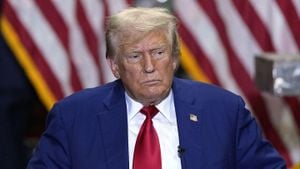China's economic strategists have shifted gears as they prepare for potential trade challenges expected from Donald Trump's anticipated policies. With the likelihood of renewed tariff hikes looming over Sino-American relations, the Chinese government has introduced several measures aimed at reinforcing its export sector, ensuring the country can weather any storm resulting from trade disruptions.
At the heart of these efforts lies a comprehensive nine-point plan outlined to stimulate exports and counteract the threats posed by Trump’s administration. This plan includes the introduction of expanded export credit insurance programs, which are set to provide more stability for Chinese businesses by safeguarding them against losses stemming from international trade. The increased backing for cross-border e-commerce also signifies China's intent to adapt swiftly to changing market dynamics, enabling Chinese enterprises to reach global customers more efficiently.
This proactive approach is, perhaps, not surprising considering the past experiences during Trump's previous term when steep tariffs became the norm, inciting retaliatory measures from China. Understanding the perils of such trade wars, the current team, led by Chinese Premier Li Qiang, is committed to fortifying the country's economic position.
According to Li Qiang, the government is also stepping up financial support for international trade initiatives, allowing firms to access capital more readily during these uncertain times. Analysts believe this could substantially bolster the resilience of Chinese exporters, giving them the necessary tools to mitigate the risk of decreased competitiveness if foreign tariffs escalate.
China is no stranger to playing the long game. Facing what some describe as the "chip war" and the ever-tightening grip of US technology sanctions, both the governmental and corporate sectors are making significant changes. Recent customs data indicated a staggering 60% surge this October alone, with China importing $1.11 billion worth of integrated circuits — positioning itself to stockpile before the anticipated policy changes take effect. This rush to secure American-made microchips demonstrates China's recognition of the potential chokehold on technology access if Trump's increasingly stringent policies take shape.
Liang Yan, a professor of economics at Willamette University, speculates, "China has been increasing the imports of chips and chip-making machinery, anticipating potentially heightened US chip sanctions." This foresight is evident as 42.5% more microchips have made their way from the US to China compared to last year, totaling $9.61 billion for the first ten months of 2024. The urgency of this procurement reflects the looming uncertainty, creating high stakes as both sides prepare for possible confrontations.
While the details of Trump's trade agenda remain to be seen, this calculated stockpiling of assets acts as both insurance and offense — protecting Chinese firms should tariffs tighten and providing leverage should trade negotiations arise. Meanwhile, the Chinese government’s commitment to aid its exporters with measures such as credit insurance and improved access to financing aligns with its broader economic goals of ensuring stability and growth amid what could become turbulent waters.
Beyond just the tariffs, many analysts are watching the geopolitical ramifications of this trade dispute closely. China’s swift response to Trump's policies not only sheds light on its internal economic strategies but also hints at its potential actions on the global stage, reflecting its desire not just to survive but to thrive amid adversarial conditions.
To encapsulate, it is evident China is steadily bracing itself for the potential challenges posed by Trump's return to office. By implementing policies aimed at safeguarding its export economy, building up reserves — particularly of technology — and ensuring financial support systems are firmer than before, China hopes to emerge more resilient. Just how successful these measures will be remains unclear, but one thing is certain: the stakes have never been higher, and the economic chess game between the two global powerhouses is set to intensify.



